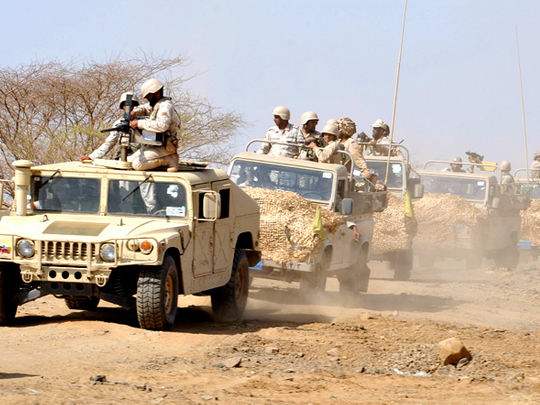
Washington: The Saudi-led coalition in Yemen is “doing everything we can to minimise civilian casualties” from air strikes, Saudi Foreign Minister Adel Al Jubeir said in Washington on Friday.
Some US lawmakers have proposed limiting arms sales to Riyadh in response to what the United Nations and human rights group say are widespread civilian casualties from the bombings.
Meanwhile, Saudi Arabia’s deputy crown prince requested a meeting with UN Secretary-General Ban Ki-moon after the United Nations infuriated Riyadh by briefly blacklisting a Saudi-led coalition for alleged killing of children in Yemen, a UN spokesman said on Friday.
Prince Mohammad Bin Salman is expected to be in New York on Tuesday for meetings with business leaders after a visit to the US West Coast, a diplomatic source told Reuters.
“An official request has come to the office of the secretary-general for a meeting with the deputy crown prince and as soon as we’re able to confirm something we shall,” UN spokesman Stephane Dujarric said.
He added that the UN had not yet responded to a June 8 letter to Ban from Saudi UN Ambassador Abdullah Al Mouallimi on behalf of the Saudi-led coalition in Yemen asking the United Nations to reveal details on the sources of information for its report on violations of child rights during armed conflicts.
Dujarric said last week the United Nations would not disclose those sources. The UN report on children and armed conflict said the coalition, which began an air campaign in March 2015 to defeat Iran-allied Al Houthi rebels, was responsible for 60 per cent of child deaths and injuries in the conflict last year, killing 510 and wounding 667.
Saudi Arabia, meanwhile, reiterated its call for air strikes against Bashar Al Assad’s regime in Syria, after US diplomats broke ranks with the White House to push for robust action.
Briefing journalists after talks at the White House, Al Jubeir said the kingdom had long urged Washington to lead a military response to undermine Al Assad’s control.
At the Saudi Embassy, Jubeir noted that from the very start of the crisis, Riyadh had pushed for “a more robust policy, including air strikes, safe zones, a no fly zone, a no drive zone.”
He said Saudi Arabia wanted to arm Syria’s “moderate opposition” with ground-to-air missiles and repeated an offer to deploy Saudi special forces in any US-led operation.
Riyadh’s position is not new: Saudi officials have long been discreetly critical of US President Barack Obama’s cautious approach to the five-year-old conflict in Syria.
But Al Jubeir was speaking after the US State Department was forced to confirm that many of its own diplomats had signed a cable on a “dissident channel” calling for more robust action in Syria.
Obama is reluctant to see US forces drawn into another Middle East conflict, and many in Washington are concerned that weapons sent to the rebels fighting Al Assad could get into the hands of extremists.
But a lengthy US and Russian led diplomatic initiative to persuade Al Assad and the opposition to begin talks on a political transition has yielded only the shakiest of ceasefires.












